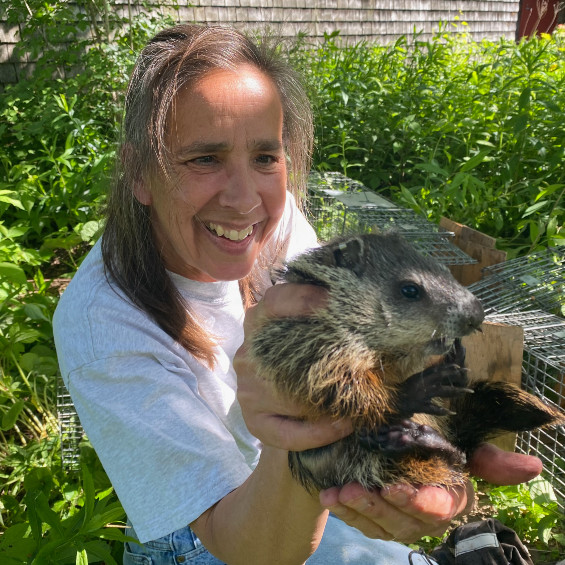Christine Maher, PhD
SHE | HER | HERS
- Professor of Biology
- Associate Dean of Academic Affairs, College of Science, Technology, and Health

Science Building, Room 178, Portland Campus
Science Building, Room 201, Portland Campus
Education
- PhD Animal Behavior, University of California, Davis
- MS Zoology, University of Idaho
- BS Zoology, Miami University
Research Interests
My research interests lie in the field of behavioral ecology and, more specifically, mammalian social behavior and social organization, in which I adopt a field-oriented approach to my research. For many years, I have examined the role that ecological conditions (e.g., food resources) play in shaping the behavior patterns of animals and, in turn, a population's spatial organization.
In 1998, I began working with woodchucks, animals whose relatives are much more social than they are. Little research has been done on these animals since the 1960s and late 1980s, so a great deal remains to be learned. I am interested in the evolution of social behavior in mammals, and these animals can be used to test various ideas about why other marmot species are more social.
Dr. Maher joined the Biology Department at USM in 1997 after 5 years on the faculty at Montana State University – Billings. She is a behavioral ecologist who studies variation in social behavior in mammals. Since 1998, she has conducted a long term behavioral study of woodchucks in southern Maine.
Dr. Maher regularly teaches the second semester course, which focuses on organismal biology (BIO 107), in the introductory sequence, and she also teaches Vertebrate Zoology (BIO 353) and Animal Behavior (BIO 405/505, 406/506).
Currently, Dr. Maher also serves as Associate Dean for Academic Affairs in the College of Science, Technology, and Health.
Selected Publications
Masters, H. and Maher, C. R. 2022. Diet reveals potential for competition and coexistence in coyotes (Canis latrans), red foxes (Vulpes vulpes), and gray foxes (Urocyon cinereoargenteus). Canadian Journal of Zoology. 100:90-97. doi.org/10.1139/cjz-2021-0103
Maher, C.R., Evangelista, B., Sponarski, C., and Lichtenwalner, A. 2020. Managing woodchucks on your Maine property. University of Maine Cooperative Extension. Bulletin #7514. https://extension.umaine.edu/publications/7154e/
Lankist, Z. and Maher, C. R. 2020. Snowshoe hare feeding behavior responds to coyote and moose cues at diverse vegetation densities. Journal of Mammalogy. 101:710-717. DOI:10.1093/jmammal/gyaa025.
Maher, C. R. 2018. Territoriality. In: Encyclopedia of Animal Cognition and Behavior (J. Vonk and T. K. Shackelford, eds.). Springer. doi.org/10.1007/978-3-319-47829-6_725-1.

Science Building, Room 178, Portland Campus
Science Building, Room 201, Portland Campus
Education
- PhD Animal Behavior, University of California, Davis
- MS Zoology, University of Idaho
- BS Zoology, Miami University
Research Interests
My research interests lie in the field of behavioral ecology and, more specifically, mammalian social behavior and social organization, in which I adopt a field-oriented approach to my research. For many years, I have examined the role that ecological conditions (e.g., food resources) play in shaping the behavior patterns of animals and, in turn, a population's spatial organization.
In 1998, I began working with woodchucks, animals whose relatives are much more social than they are. Little research has been done on these animals since the 1960s and late 1980s, so a great deal remains to be learned. I am interested in the evolution of social behavior in mammals, and these animals can be used to test various ideas about why other marmot species are more social.

